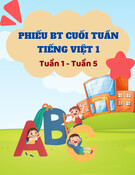
ÔN TẬP KIỂM TRA GIỮA HỌC KÌ 2-ANH 8 – NH 2022-2023
TEST FOR UNIT 7
I. Choose the word whose underlined part is pronounced differently from the others.
1. A. disease B. dead C. treatment D. sneeze
2. A. environment B. billboard C. visual D. litter
3. A. birth B. thermal C. earth D. further
4. A. poisoned B. died C. dumped D. caused
5. A. contaminant B. waste C. illustrate D. radiation
II. Choose the word whose main stress pattern is placed differently.
1. A. environment B. temperature C. botanical D. contaminant
2. A. untreated B. aquatic C. pollution D. electronic
3. A. pollute B. poison C. damage D. illustrate
4. A. presentation B. radioactive C. environmental D. contamination
5. A. permanent B. Chemical C. dramatic D. herbicide
III. Complete each sentence with an appropriate word. The first letter of each word is given.
1. The fish have died because the river water is heavily p________.
2. Health e________ from air pollution include lung cancer, and respiratory diseases.
3. Acid rain causes serious d________ to plants and trees.
4. If the air wasn’t dirty, Nick w________ sneeze so much.
5. The main gases that l________ to acid rain are sulfur dioxide and nitrogen dioxide.
6. There is a danger of serious contamination from radioactive w________.
7. Hundreds of d________ fish were found floating in the river near the factory.
8. U________ sewage can spread disease and contaminate drinking water sources.
IV. Choose the best answer A, B, C or D to complete the sentence.
1. After the accident, many people were exposed________ radiation.
A. from B. at C. to D. with
2. Light pollution has a wide range of negative effects________ I’m human health.
A. on B. of C. for D. to
3. ________can cause high blood pressure, heart problems, sleep disturbances, and hearing problems.
A. Air pollution B. Light pollution C. Water pollution D. Noise pollution
4. The levels of carbon dioxide in the atmosphere have risen________ the burning of fossil fuels.
A. therefore B. because C. in spite of D. due to
5. If rubbish is non-biodegradable, it________ forever.
A. exists B. will exist C. won’t exist D. doesn’t exist
6. ________are Chemicals that are used to kill unwanted plants, such as weeds.
A. Fertilizers B. Pesticides C. Herbicides D. Pollutants
7. There would be much less pollution________ people stopped using cars completely.
A. if B. since C. when D. although
8. Emissions of pollutants into the air can________ changes to the climate.
A. get on B. end up C. go into D. result in
9. ________can we help save our environment?
A. What B. How C. Why D. How much
10. If we care about plastic waste________.
A. why won’t we stop drinking bottled water? B. we would use reusable shopping bags
C. we will throw away plastic water bottles. D. why don’t we buy plastic bags?
V. Choose the underlined word or phrase, A, B, c or D that needs correcting.
1. What will happen if the Earth stopped moving?
A B C D
2. One of the things all of us can do to protect and improve our environment is recycle.
A B C D
3. Humans can even die if they will drink contaminated water.
A B C D
4. Long-term exposure to loud noise results permanent hearing loss.
A B C D

VI. Write the correct tense or form of the verbs in brackets.
1. It would be better for the environment if more people________ (use) bikes rather than cars.
2. If we use less energy, we________ (help) reduce greenhouse gas emissions.
3. Every year, million tons of plastic________ (dump) into the oceans.
4. A thick smog________ (settle) over New Delhi since winter________ (begin).
5. Noise pollution can________ (cause) by vehicle, aircraft, and industrial noise.
6. Human activities________ (destroy) nature at an unacceptable rate right now.
7. A decade ago, WHO________ (classify) air pollution as a link to lung cancer.
8. What________ (happen) if all the pollution in the world________ (disappear)?
9. At 8 o’clock last night, I________ (watch) “A Plastic Wave”, a documentary on plastic pollution.
10. We should avoid ________ (buy) frozen foods because their packaging is mostly plastic.
VII. Match the questions to the answers.
1. What is the main reason for thermal
pollution?
2. What effect does thermal pollution have on
aquatic animals?
3. How to minimize the water pollution due to
Chemicals?
4. What diseases are usually caused by air
pollution?
5. Which gas is mainly responsible for global
warming?
6. What are the effects of noise pollution?
7. Why are plastic bags a big environmental
nuisance?
8. What are sources of radioactive pollution?
a. They are non-biodegradable and create an
environmental harzard.
b. Nuclear wastes from nuclear power plants,
mining and processing of nuclear material etc.
c. Carbon dioxide. It contributes about 55% to
global warming.
d. It affects their growth and may kill off them.
e. Hot water released by power plants and
industries.
f. Sleep disturbance, high blood pressure,
emotional problems and annoyance.
g. Rickets, throat cancer, lung cancer and
breathing problem.
h. Treat wastewater before discharging into a
flowing body of water.
VIII. Choose the word which best fits each gap.
Many human activities over the last 200 years have been responsible (1) ________ polluting the
air and damaging people’s health. Automobile engines and power plants burn combustible (2)
________ like gasoline and coal and allow toxic gases and smoke to escape into the air. Some
pollutants destroy the ozone layer, which is the thin blanket of gases that (3) ________ Earth from the
Sun’s dangerous ultraviolet rays. Other pollutants contribute to (4) ________ warming by adding to the
planet’s natural greenhouse effect. Still others create acid rain, a phenomenon that has disastrous (5)
________ on lake and forest habitats. Air pollution is not limited to industrial areas. Depending on the
direction of the wind and its force, air pollutants may (6) ________ spread to other countries very far
from the source of the pollution.
Big cities like Los Angeles and Mexico City are*often covered by smog, a fog that occurs (7)
________ air pollution. In 1952, the City of London, England, was enveloped by smog so thick that
people on the streets had to feel their way around by (8) ________ the walls of buildings!
1. A. for B. of C. to D. with
2. A. chemicals B. means C. fuels D. matters
3. A. covers B. protects C. stops D. damages
4. A. environmental B. thermal C. temperature D. global
5. A. affects B. causes C. sources D. effects
6. A. never B. even C. ever D. hardly
7. A. because of B. in spite of C. instead of D. due of
8. A. climbing B. walking C. touching D. putting up
IX. Joining two sentences, using the words in brackets.
1. We must conserve water. Otherwise we will face serious water shortages. (IF)
____________________________________________________________________
2. The weather was awful. We didn’t enjoy our camping holiday. (BECAUSE OF)
____________________________________________________________________

3. Plastic bags are non-biodegradable. They will remain in the environment for many years. (SINCE)
____________________________________________________________________
4. Paul doesn’t think about the planet. He wastes so much water. (IF)
____________________________________________________________________
5. Water pollution happens. Many aquatic animals such as fish can die. (LEAD)
____________________________________________________________________
6. The climate is changing. The earth is getting warmer. (BECAUSE)
____________________________________________________________________
7. We should stop cutting down so many trees. We endanger our oxygen supply. (UNLESS)
____________________________________________________________________
8. People begin to recycle. They generate much less trash. (WHEN)
____________________________________________________________________
9. We are damaging the ozone layer. The ozone layer is necessary for human existence. (EVEN
THOUGH)_______________________________________________________________
10. Sue is suffering from skin cancer. She was exposed to radiation when she was young. (SO)
TEST FOR UNIT 8
I. Choose the word whose underlined part is pronounced differently from the others.
1. A. camp B. language C. native D. accent
2. A. capital B. scenic C. Scotland D. iconic
3. A. increased B. provided C. haunted D. founded
4. A. loch B. schedule C. French D. chaos
5. A. brigade B. kilt C. liberty D. icon
II. Choose the word whose main stress pattern is placed differently.
1. A. American B. Canadian C. Australian D. Portuguese
2. A. monument B. symbolize C. attraction D. spectacle
3. A. natural B. trainee C. unique D. parade
4. A. territory B. festivity C. traditional D. geography
5. A. official B. legendary C. historic D. iconic
III. Choose the best answer A, B, C or D to complete the sentence.
1. Residents from Liverpool speak English__________ a different accent.
A. with B. as C. on D. under
2. Last summer, Mike spent two weeks__________ a summer camp.
A. for B. in C. on D. at
3. The inhabitants of Scotland are called__________.
A. Scotlanders B. Scotlish C. Scots D. Scotchs
4. Her English accent is so good that she is thought of as a__________ speakers.
A. natural B. official C. non-native D. native
5. Loch Ness is a__________ in the Highlands of Scotland.
A. person B. lake C. valley D. river
6. ____ having two official languages, Canada has the third largest English-speaking population.
A. Despite B. Because C. Due to D. Even though
7. The Capital of Canada is__________.
A. Edinburgh B. Ottawa C. Cardiff D. Belfast
8. __________ your international summer camp going? - It’s just awesome.
A. How’s B. What’s C. Where’s D. When’s
9. Susan looks forward__________ a music camp, where she can sing and dance.
A. to attend B. to attending C. to be attended D. be attending
10. Where do Maoris live?
A. Scotland B. Australia C. Canada D. New Zealand
IV. Choose the underlined word or phrase, A, B, c or D that needs correcting.
1. Could you meet us at the airport tomorrow afternoon? Our flight will land at 4 o’clock.

A B C D
2. Scottish kilts were traditionally wore as full length garments by Gaelic-speaking male.
A B C D
3. The Australian flag consists a dark blue field with the Union Jack and six white stars.
A B C D
4. I find it’s difficult to understand some of my Scottish friends because of their accent.
A B C D
5. Niagara Falls is one of the most spectacle waterfalls in the world.
A B C D
6. Visitors to Scotland can spend endless days to explore its historic centuries-old castles.
A B C D
V. Write the correct tense or form of the verbs in brackets.
1. I__________ (already/ apply) for a sports summer camp in the UK.
2. Minh usually__________ (watch) movies in English and it__________ (help) improve his English.
3. We__________ (visit) the Statue of Liberty and Ellis Island if we go to New York.
4. Where__________ (you/ go) on your holiday next summer?
5. The Viking__________ (invade) Ireland in the 9th century.
6. English__________ (speak) as the primary language in many countries around the world.
7. If it __________ (not rain) today we’d take a trip to Edinburgh Castle.
8. The 12th English Teaching Conference__________ (take place) on 5-12 June.
9. Since the late 1980s, the economy of Ireland__________ (grow) rapidly.
10. Everyone__________ (sleep) when the earthquake__________ (hit) the small town two days ago.
11. Do you have difficulty__________ (understand) your Australian friends?
12. Let’s__________ (visit) medieval castles. It’s really interesting, I think.
VII. Supply the correct form of the words in brackets.
1. Many companies recruit graduate__________ to train as managers. (train)
2. The pronunciation course will help you make a big__________ in your spoken English. (improve)
3. Many__________ students choose to study in Australia because of the high quality
of education. (nation)
4. Is the Loch Ness Monster a real or__________ creature? (legend)
5. People around the world see the Statue of Liberty as a Symbol of__________. (free)
6. The__________ in Switzerland is exceedingly attractive to the tourists. (scenic)
7. Vancouver and Toronto are__________ liveable cities in the world. (famous)
8. One of the less__________ features of California is the threat of earthquakes. (attract)
9. Both__________ and English are the official languages of Ireland. (Ireland)
10. Denali State Park is one of North America’s most__________ beautiful regions. (spectacle)
VIII. Read the passage carefully and choose the correct answers.
NATIVE AMERICANS
Native Americans have been living in what is now the United States of America since long
before any Europeans came. They are not just a single group of people - there are many different tribes
of Native Americans. Different Native American groups have different languages, religious believes,
and ways of living, or folkways.
The Hopi are Native Americans who come from what is now the American Southwest. When
the Spanish came to America in the 16th century and found the Hopi people, they nicknamed them
“pueblo people” because Hopi people didn’t move around much - they lived together in what
amounted to towns. Pueblo is a Spanish word that means “town.” The Hopi have always been a very
peaceful people. Their name comes from the term Hopituh Shi-nu-mu, which means, in the Hopi
language, “The Peaceful People” or “Peaceful Little Ones.”
The Navajo come from the same general area as the Hopi. But instead of staying in one place,
they moved around. They didn’t live in permanent towns like the Hopi. They were a “semi-nomadic”
people. While the Hopi were historically known for farming, the Navajo were known for hunting and

gathering. After they met the Spanish, the Navajo became known for herding sheep. The Hopi, not so
much.
Today, there may not be as many thriving Native American tribes as there used to be, but there
are more than a few. All in all, there are about 1,000 different groups of Native American people in the
United States, and each group is unique.
1. How long have Native Americans been living in America?
A. A few decades B. Since after the arrival of Europeans
C. About the same time as the Europeans D. Long before any Europeans came
2. Why does the author compare different Native American tribes?
A. to show that they all come from the same region of North America
B. to show how different Native American tribes can be
C. to show the different ways Native American tribes found food
D. to show the traveling patterns of different Native American tribes
3. Which of the following is NOT true about the Hopi?
A. They live in the American Southwest. B. They were farmers.
C. They travelled from place to place in search of land. D. They enjoyed a peaceful way of life.
4. What does the word “permanent” most nearly mean?
A. changing B. cultural C. long-lasting D. unstable
5. After the Spanish arrived in the 1600s, the Navajo
A. didn’t live in permanent towns. B. lived by hunting and gathering.
C. moved from their homeland. D. began to farm sheep.
6. What can be inferred about the number of Native American tribes?
A. There are more Native American tribes today than in the 16th century.
B. There are fewer Native American tribes today than in the 16th century.
C. There are the same number of Native American tribes today as in the 16th century.
D. It is unclear about the number of Native American tribes.
7. What is the main idea of this passage?
A. Native American tribes can be very different from one another.
B. Native American tribes should be recognized for their similarities.
C. The Spanish had a dramatic effect on Native American tribes.
D. The Hopi and Navajo are the two most important Native American tribes.
TEST FOR UNIT 9
I. Choose the word whose underlined part is pronounced differently from the others.
A. scatter B. shake C. collapse D. evacuate
A. trapped B. damaged C. destroyed D. moved
A. violent B. minor C. disaster D. climate
A. typhoon B. flood C. food D. school
A. earthquake B. weather C. without D. though
A. technology B. psychology C. character D. charge
II. Choose the word whose main stress pattern is placed differently.
1. A. scientific B. sociology C. geography D. medication
2. A. collapse B. destroy C. provide D. scatter
3. A. tsunami B. tornado C. property D. eruption
4. A. volunteer B. accurate C. wonderful D. terrible
5. A. victim B. typhoon C. damage D. shelter
III. Complete each sentence with a suitable word.
1. _________ are giant waves caused by earthquakes or undersea volcanic eruptions.
2. Rescue workers have freed people who were_________ in flooded homes.
3. A lot of houses were destroyed, and thousands of people were left_________.
4. The Red Cross provided temporary housing to earthquake_________.
5. The Kilauea volcano_________ last year, destroying an estimated 700 homes.
6. _________ eruptions occur when magma escapes from inside the earth.
7. Firefighters are still trying to_________ out forest fires in Gori Municipality.
8. Last August, a 7-magnitude_________ hit Lombok island, Indonesia.



![Tài liệu tham khảo Tiếng Anh lớp 8 [mới nhất/hay nhất/chuẩn nhất]](https://cdn.tailieu.vn/images/document/thumbnail/2025/20250806/anhvan.knndl.htc@gmail.com/135x160/54311754535084.jpg)










![Phiếu bài tập cuối tuần Tiếng Việt 1 tuần 2 đề 2: [Hướng dẫn chi tiết]](https://cdn.tailieu.vn/images/document/thumbnail/2025/20250728/thanhha01/135x160/42951755577464.jpg)

